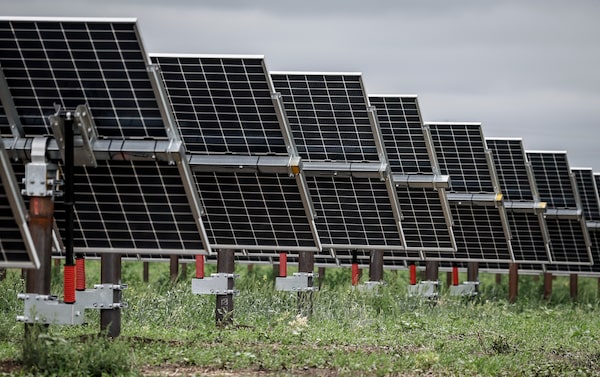
Solar panels at the Michichi Solar project near Drumheller, Alta. on July 11. The Alberta provincial government has extended its seven-month pause on wind and solar project approvals to include geothermal energy.Jeff McIntosh/The Canadian Press
When Alberta’s Environment Minister arrives in Germany this week for the inauguration of a massive geothermal energy project, developed by a Calgary company, her baggage will include her government’s decision to pause all geothermal power project approvals as part of a broader moratorium on renewables.
The United Conservative Party government imposed a seven-month halt on application approvals for new wind and solar projects on Aug. 3. Renewable-energy developers and investors have expressed their frustration and questioned the stated reasons for the move, which include addressing end-of-life reclamation and studying how more renewables affect arable farmland and grid reliability.
The bulk of the discussion around the renewables moratorium has centred on wind and solar power projects, but geothermal is also affected, as are plans for sustainable biomass or hydroelectric facilities.
Being subsurface, geothermal energy projects have much more in common with Alberta’s traditional oil and gas sectors than with solar or wind, points out Sara Hastings-Simon, an assistant professor at the University of Calgary whose work focuses on the energy transition.
So the government’s justification for a pause for renewables development – particularly around preserving viewscapes and agricultural land use – “don’t stand up to scrutiny,” Dr. Hastings-Simon said.
Geothermal investment in Alberta hasn’t grown at the rapid clip of solar and wind. But it has steadily gained momentum as jurisdictions around the world look for reliable baseload power without the greenhouse gas emissions that accompany coal or natural gas.
That makes pausing the sector “even more so about the signal that you’re sending to developers and to investors who are looking at the space as a whole, and trying to decide where they want to make those investments,” Dr. Hastings-Simon said.
“It’s just another really unfortunate throttling of what could be a growing industry in Alberta.”
But Alberta Environment Minister Rebecca Schulz said in an interview Tuesday that the technology remains a key part of Alberta’s energy future, alongside natural gas, hydrogen and small modular nuclear reactors.
On Thursday, she will attend the inauguration of the world’s first commercial Eavor-Loop geothermal project, in Germany, alongside a host of government officials including German Chancellor Olaf Scholz and Bavarian Prime Minister Markus Söder.
From black gold to hot water: Inside Western Canada’s geothermal push
Calgary-based Eavor Technologies Inc. drilled its first full-scale demonstration project in 2019, near Rocky Mountain House, Alta. It then attracted the interest of Germany, which was offering incentives to inject more geothermal power into the grid to provide reliable baseload power as the country moved away from nuclear.
Ms. Schulz said while in Germany she will discuss with government officials and industry executives how Alberta can best incentivize geothermal investments.
Asked whether including geothermal power in her government’s own pause on renewables could undercut that message, she reiterated that the review is important to ensure Alberta has adequate reclamation rules and can maintain grid reliability.
“I think this is an exciting time for us to be having these discussions,” she said.
Business Renewables Centre Canada, a Calgary-based organization that matches renewable developers and buyers, said that the Alberta Utilities Commission (AUC) must do all it can to reduce market uncertainty by applying as narrow a scope as possible to their pause on approvals over the course of the eight-month, government-ordered review.
“For the AUC, our main ask is it ... allow projects to still go through the full process up until approvals,” said Jorden Dye, acting director of BRC-Canada.
Doing so would avoid a gap of at least eight months in projects, “and it would also signal to the market that this isn’t going to be a drastic, complete rewrite of renewable energy in the province,” Mr. Dye said.
The moratorium on approvals began on Aug. 3 and runs to Feb. 29, 2024, but the final report from AUC isn’t due until March 29, 2024.
Ideally, BRC-Canada would like to see the pause lifted altogether, and the review occur alongside project development.
“This is global capital that we’re competing for,” Mr. Dye said, adding that Canada is already fighting to attract capital investments here despite recent incentives announced in the United States.
Dr. Hastings-Simon likened the level of uncertainty that Alberta’s decision has wrought on the renewables space to Doug Ford’s move to cancel Ontario’s cap-and-trade system in 2018.
“You’re still seeing the repercussions of that. Investors are not quick to forget when governments play outside the bounds of what I would call normal policy development,” she said.
“If you were trying to design something that would create as much uncertainty as possible for investors, you would do something like what Alberta has done – this secret surprise announcement with no consultation beforehand. Any investor that’s looking in the future says, ‘Well, if that can happen at any time, where does that leave me?’ ”
 Emma Graney
Emma Graney